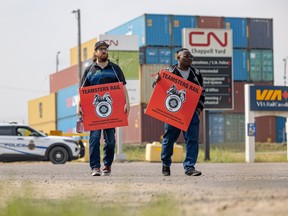The Canadian Pacific Kansas City railway and CN Rail are shut down. In Canada, between them, they carry about $1-billion of goods each day
Article content
The deadline passed at midnight Wednesday. In the absence of any agreement on contracts or binding arbitration, 9,300 railway workers, including conductors, yard crews and engineers, are now locked out of work and on strike. Two transcontinental railways are closed as a result, picket lines are going up across the country, and recriminations are starting to swirl. The National Post runs through what this means for the common Canadian.
Advertisement 2
Article content
What services are shut down?
Two freight railways are shut, the Canadian Pacific Kansas City (CPKC) railway and the Canadian National Railway. Both operate in Canada and the United States, and CPKC also operates in Mexico. In Canada, between them, they carry about $1-billion of goods each day. Other services such as commuter transit also use their tracks.
What about passenger trains?
Via Rail has said it could see service disruptions in Northern Ontario, but would be able to operate without major disruption, and it has not otherwise commented on how the strike and lockout will affect its intercity trains. Instead, it has been asking people who pose this question on social media to contact them for a private direct message.
In the Toronto area, GO Transit alerted passengers that its commuter train service might be busier than normal, and service was suspended on parts of the network between Hamilton and Toronto.
In Vancouver and British Columbia’s Lower Mainland, service on the West Coast Express is suspended and backup buses are being called into action.
Three commuter lines run by Exo in Montreal have been shut, with contingency plans set to start on Monday, and commuters encouraged to use the municipal bus service in the meantime.
Article content
Advertisement 3
Article content
Can the Oilpatch keep exporting?
Canada exports on average more than 100,000 barrels of crude oil a day, much of which passes through Lloydminster, a city in Alberta at the Saskatchewan border and site of a major refinery. The mayor, Gerald Aalbers, told National Post the city’s residents are “hoping for the best but preparing for the worst.”
What about farmers?
The Grain Growers of Canada estimated that farmers in Western Canada could lose up to $50 million a day in a strike, coming as it does in harvest season.
Much grain, including about 80 per cent of wheat, is shipped to elevators on railway lines for temporary storage on its way to market. With no rail cars moving, those fill up. Some can be stored locally on farms, unsold, and some can be trucked if the geography is right, although it is likely to lose value due to limited reach.
“The economic impact of this stoppage will be felt far beyond the farm gate,” said Andre Harpe, chair of the Grain Growers of Canada.
What other services could be disrupted?
Air travel, for example. It’s estimated that as much as half of the aviation fuel used at Toronto Pearson International Airport comes by rail, and any disruption in that supply would have knock-on effects on flights. Toronto Pearson clarified Thursday, however, that much of its fuel supply comes by pipeline and truck, and that with its onsite storage capacity, it would not be seriously affected for weeks “or even months.”
Advertisement 4
Article content
Can groceries still get here, such as fresh produce from the southern U.S. and Mexico?
Industry watchers have suggested the effects of the rail strike on grocery store offerings are likely to be felt first, and most deeply, in Western and Atlantic Canada.
Many large retailers would already have set contingency plans in motion, but smaller businesses would start facing lost sales. One recent estimate said lost sales in the food, health and consumer product sector would reach $40 million a day in Western and Atlantic Canada after just 10 days of railway lockout.
What’s the outlook?
Labour Minister Steven MacKinnon, who recently took over from Seamus O’Regan after his exit from politics, was said to be in talks all day aiming to facilitate a quick resolution. He previously rejected a request from CN to impose binding arbitration on the contract talks, saying negotiations would lead to a better settlement. Contract talks are also due to resume in Montreal and Calgary.
Perrin Beatty, president of the Canadian Chamber of Commerce, told the Post the government should have stopped the work stoppage before it started, but should now intervene to get the economy back on track.
Advertisement 5
Article content
Prime Minister Justin Trudeau said: “We’re taking it seriously. The minister is engaged directly. We are not taking this lightly, obviously, because Canadians across the country are worried about it. We will have more to say shortly on what we’re doing to make sure that the right solution is found quickly for the economy.”
Recommended from Editorial
Our website is the place for the latest breaking news, exclusive scoops, longreads and provocative commentary. Please bookmark nationalpost.com and sign up for our daily newsletter, Posted, here.
Article content









